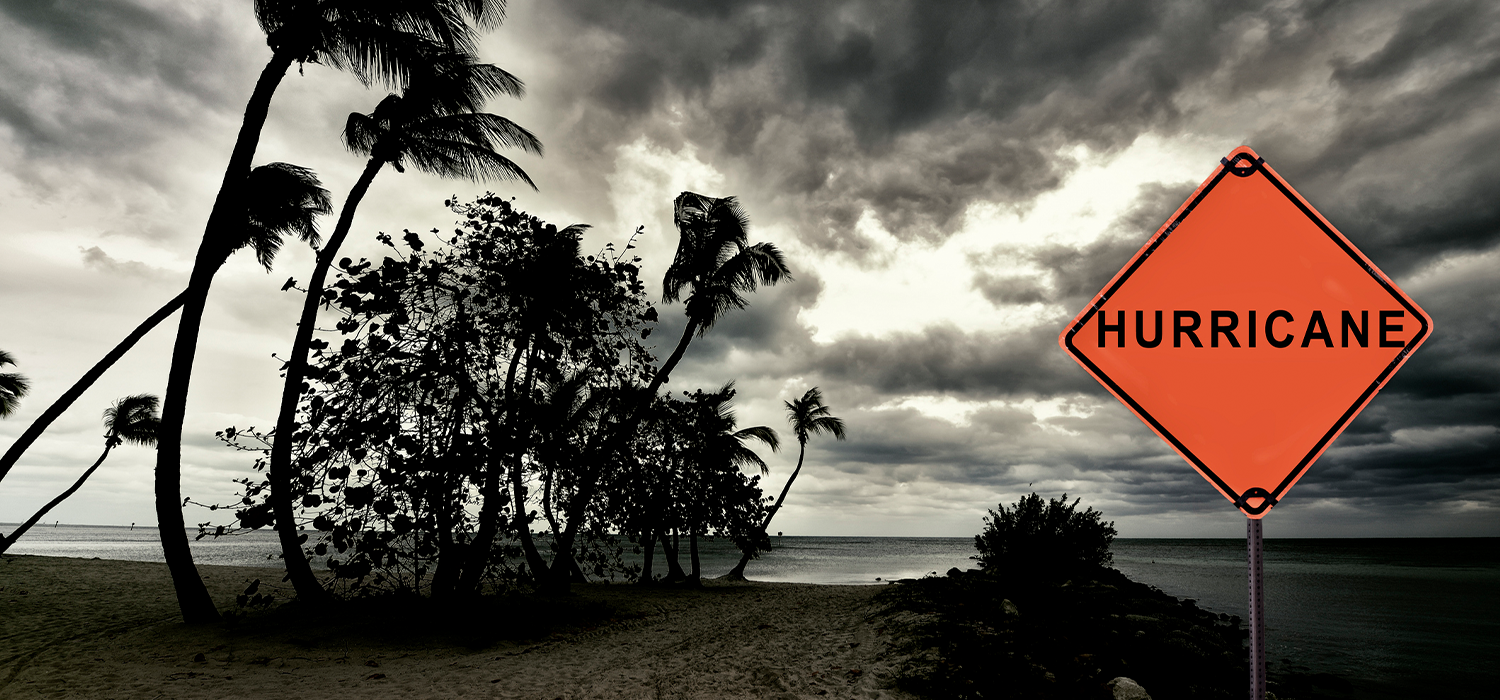Your Guide to Hurricane Season
Posted in Travel on 19 July 2024

Hurricanes are powerful natural phenomena that can cause widespread destruction, particularly in the Caribbean and Atlantic regions. Recently, Hurricane Beryl wreaked havoc, serving as a stark reminder of the dangers these storms pose. But what exactly is a hurricane, why are they so dangerous, and what do you need to be aware of when travelling this hurricane season?
What is a Hurricane?
A hurricane is a type of tropical cyclone, which is a rapidly rotating storm system characterised by strong winds, thunderstorms, and heavy rain. Hurricanes are formed over warm ocean waters and are classified into five categories based on their sustained wind speeds. There are 5 hurricane categories ranging from 1 (least severe) to 5 (most severe), Category 1 hurricanes have winds of 74-95 mph, while Category 5 hurricanes boast winds exceeding 157 mph.
When is Hurricane Season?
Hurricane season in the Atlantic runs from June 1 to November 30, with the peak occurring from mid-August to late October. During this period, conditions are ideal for the formation of these powerful storms. It’s crucial for travellers to be aware of this timeline, especially when planning trips to hurricane-prone areas.
Hurricane Beryl
Hurricane Beryl, the latest storm to make headlines, formed in early July and rapidly intensified from a minor storm to a category 4 event in just 2 days. Beryl is also the first category 5 hurricane to be registered this early in the year with most major storms forming closer to September. Since tearing through the Caribbean, Beryl has now hit Texas, however, it has calmed slightly, now registering as a category 1 storm but still strong enough to leave over 2 million people without power.
In Dominica, Beryl's winds uprooted trees, damaged roofs, and caused power outages across the island. Puerto Rico, still recovering from the devastating impacts of Hurricane Maria in 2017, faced renewed flooding and infrastructure strain. The storm's impact underscored the importance of preparedness and the potential for even smaller hurricanes to cause significant damage.
The Dangers of Hurricanes
Hurricanes are dangerous for several reasons:
High Winds: Category hurricane winds can cause catastrophic damage to buildings, trees, and power lines.
Heavy Rainfall: Intense rainfall can lead to flash flooding and landslides, particularly in mountainous or deforested areas.
Storm Surges: The combination of high winds and low pressure can drive seawater onto land, causing severe coastal flooding.
Staying Safe During a Hurricane
If you find yourself on holiday and in the path of a hurricane, here are some key safety tips:
Stay Informed: Regularly check local news and weather updates. Many hotels and resorts will provide updates and advice, so make sure to listen to their instructions. Mobile apps and alerts from services like the National Hurricane Centre can also provide timely information.
Follow Evacuation Orders: If local authorities issue an evacuation order, follow it immediately. Your safety is the priority. Most tourist accommodations will have evacuation plans in place; familiarise yourself with these and know your evacuation route.
Communicate Your Location: Let family and friends know your whereabouts and your safety plans.
Prepare an Emergency Kit: If you need to stay in place, ensure you have essential supplies. This includes bottled water, non-perishable food, medications, a flashlight, a fully charged mobile phone with backup batteries, and important documents such as your passport and Travel Insurance details.
Secure Your Accommodation: If you are unable to evacuate, make sure your accommodation is secure. Close and lock all windows and doors and move away from windows to a more secure area like a bathroom or a lower-level room.
Stay Indoors and Avoid Elevators: The high winds and flying debris can be extremely dangerous. Stay in a central, windowless room if possible, and avoid using elevators.
Travel Insurance: Ensure you have Travel Insurance that covers adverse weather conditions, particularly if you’re traveling to hurricane-prone areas like the USA or Asia during their respective hurricane seasons.
Travel Insurance and Hurricanes
With the increasing frequency and intensity of hurricanes, having the right Travel Insurance is more important than ever. Policies that cover adverse weather can provide peace of mind and financial protection against trip cancellations, delays, or the need for emergency evacuation. When planning your trips, especially during hurricane season in the Atlantic, consider buying a Travel Insurance policy that meets your needs and safeguards your travel plans. Securing Travel Insurance for adverse weather is a crucial step in ensuring a safe and enjoyable journey.
Get Your Travel Insurance with Voyager Plus
Voyager Plus policies offer four levels of cover, including Single Trip and Annual Multi-Trip Travel Insurance options, access to GP on Demand, and include cover for the following:
- Emergency Medical Expenses – up to £10,000,000
- Cancellation Cover – up to £10,000
- Baggage Cover – up to £3,500
- 100s of activities covered as standard
- Cover for 100s of pre-existing medical conditions
And so much more!
Click here to find out more about our Voyager Plus Travel Insurance.
Adverse weather can really ruin your trip and can be a serious cause for concern depending on the strength of the storm, however, if you’re looking for Travel Insurance to the USA or Travel Insurance for travelling Asia for peace of mind, why not see if Voyager Plus can meet your needs.
This article is for information and entertainment purposes only. It does not constitute advice in any way. The information provided here is correct at the time of writing however please check the latest policy wording for the latest terms, conditions, and exclusions.
Other Related News Articles...
- Our Ultimate Easter Travel Guide to Hotspots and Hidden Gems


